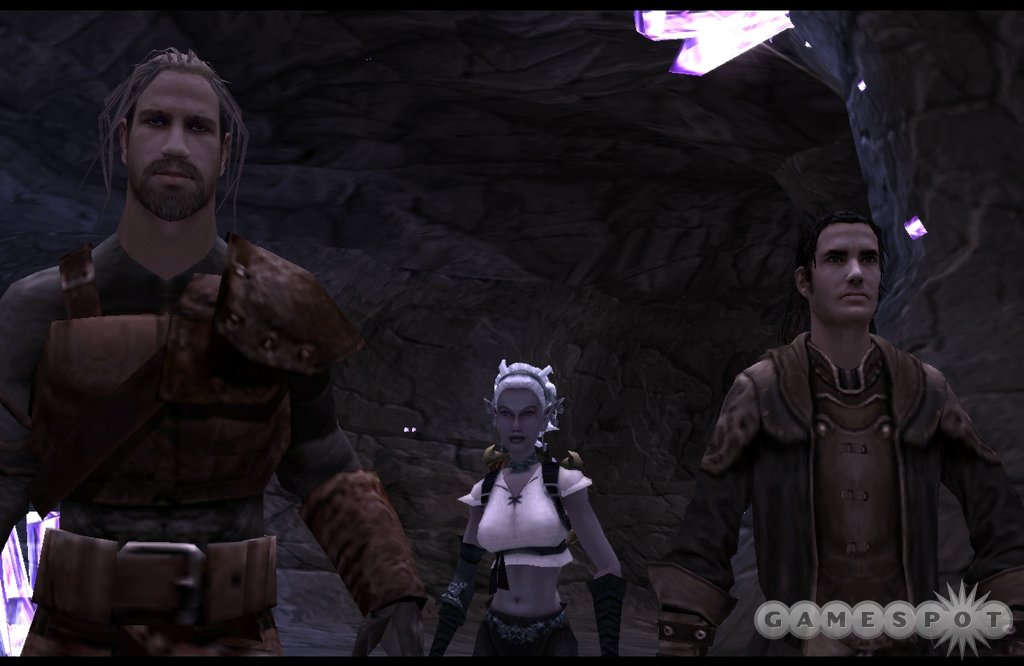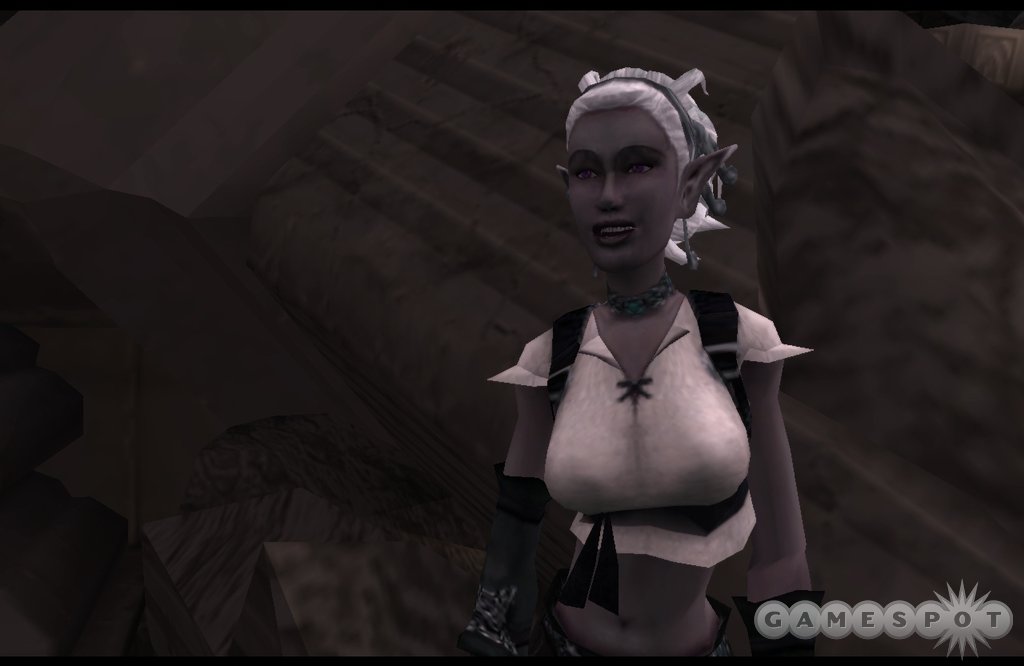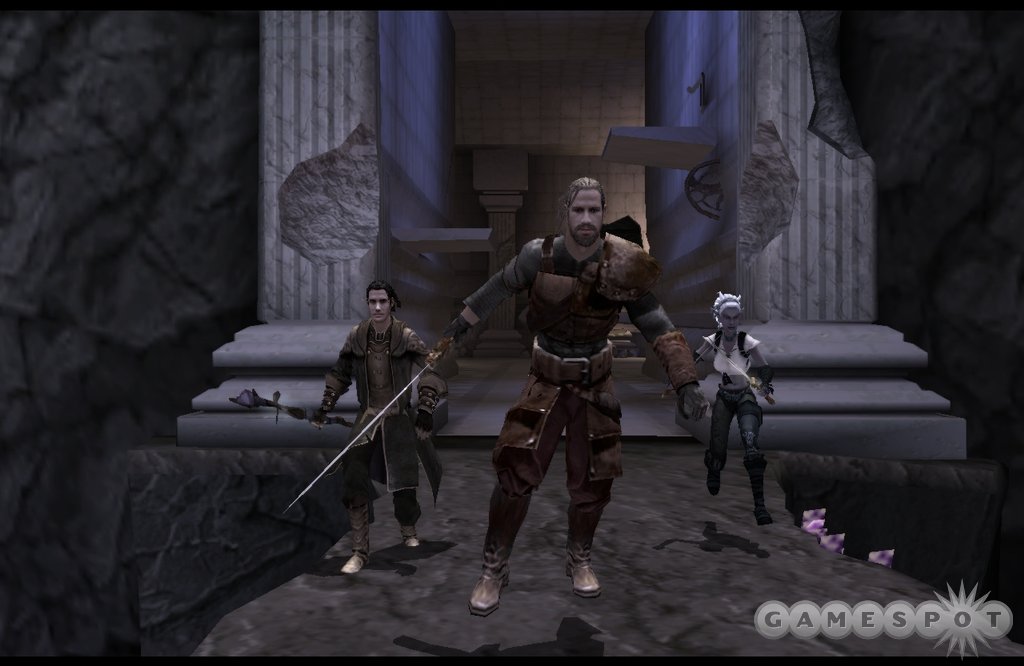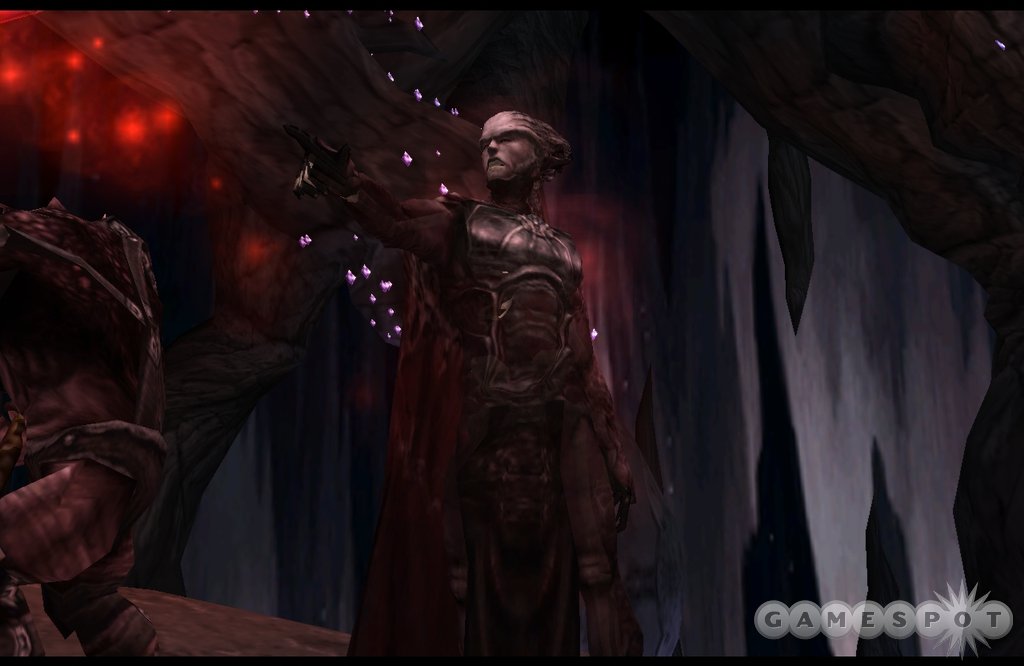Within the dominion of high fantasy, there are two staples upon which you can always rely. Running parallel are J.R.R. Tolkien's The Lord of the Rings and the Dungeons & Dragons universes--the former of which stays grounded thanks to a Victorian travelogue-level of mundane detail, and the latter of which benefits from a voluminous world and detailed mythos. A couple of years ago, Northern California-based developer Stormfront Studios established an accessible, enjoyable formula for melding the high-fantasy feel with visceral action in The Lord of the Rings: The Two Towers, and now it brings the same to the Dungeons & Dragons world. Forgotten Realms: Demon Stone is a small evolutionary step above what Stormfront did with The Lord of the Rings: The Two Towers, and players who appreciate that brand of brute-force, hack-and-slash gameplay should find in it a great-looking and enjoyable, if somewhat familiar, experience.

A party of heroic characters that goes out on grand quests is the very bedrock of the Dungeons & Dragons experience--and, really, of all its high-fantasy ilk--and Demon Stone delivers this staple on multiple levels. The story begins years ago, when Slaad Lord Ygorl and the Githyanki General Sereka, the malevolent leaders of two powerful, destructive armies that have been fighting over the right to pillage the world of Faerûn, find themselves imprisoned in a mystical Demon Stone by a clever wizard named Blackstaff. Now jump to the present, where three individual adventurers--Rannek the fighter, Illius the sorcerer, and Zhai the rogue--find themselves allied on a battlefield rife with orcs. Each is there with his or her own agenda, though upon entering the secret chamber that houses the Demon Stone and accidentally freeing the evil antagonists, the three find that their fates are intertwined. Consequently, they embark on a quest to re-imprison Ygorl and Sereka. The story is pretty archetypal, though the inclusion of two antagonists who are also at each other's throat is a nice one, and overall, the story's delivered quite well. The game uses nice, quick cutscenes to keep the story moving, and it usually manages to do so without disrupting the flow of the action too much.
D&D aficionados will be especially interested to know that Demon Stone was scripted by R.A. Salvatore, who has authored a vast number of novels based on the D&D world of Forgotten Realms. His familiarity with the subject matter is apparent, because he employs a great many characters and locales that those familiar with the Forgotten Realms universe will recognize.
Within this nicely established Dungeons & Dragons scenario, Demon Stone proceeds to hurl seemingly insurmountable numbers of foes at your party of three. Though the numbers can seem overwhelming, your party is more than capable of handling the workload. Melee combat is the primary means of taking out the bad guys, which mostly consists of a few three-button combos. However, as you play, you'll learn the nuances of the system, such as riposte and recovery moves, charged attacks, and the all-important coup de grâce move, which is great for finishing an enemy who has been knocked down but is threatening to get back on his or her feet. On top of the core combat, each character also has a ranged attack, a unique supermove, a team-up move that lets you call upon your teammates for a quick assist, and a screen-clearing team supermove. All of these actions are quite useful when the odds are heavily stacked against you. Once you get the hang of one character, the other two are pretty easy to adapt to, since all three share a lot of the same basic moves.
Of course, each has his or her own specific strengths too. Rannek's core melee moves are particularly brutal, and players will likely find him the easiest to use overall, because he doesn't require an incredible amount of finesse to use well. Illius the sorcerer possesses strength that resides in his ranged spells, which are more powerful than the other characters' ranged attacks, making them more useful for dispensing out-of-reach enemies. Zhai's stealth moves make her the most unique of the three, simply because her mechanics are unlike anything that either Rannek or Illius has. When playing as Zhai, you'll notice that shadowy areas are highlighted with a distinct speckled glow. If you move into a shadowed area for a second, you essentially become invisible for a short period of time. Save for a few specific instances, the game doesn't really demand that you sneak around your enemies a lot. However, when you're stealthed, you can creep up on unsuspecting enemies to execute them with single moves, which can be quite satisfying. The PC version of Demon Stone uses a slightly modified take on the standard first-person shooter keyboard-and-mouse controls by default, which works fairly well, though if you have a gamepad with an analog stick and an adequate number of buttons, the experience will feel a bit more streamlined.

While the game seems fairly friendly to basic button-mashing tactics in the beginning, it's quite necessary to understand the strengths and abilities of your party, which becomes apparent after the first few levels. Fortunately, Demon Stone does a pretty good job of introducing the basic combat tactics over the course of the first two levels. But even on the default difficulty, the game offers a respectable challenge, so know that if you have three or four trolls surrounding you, it won't take long for them to empty your health bar. The boss battles can also be particularly tough, as they tend to require some specific tactics that aren't always obvious, and they don't leave a lot of room for slop. Though the only hard save points in the game exist at the end of each level, Demon Stone breaks the levels up into nicely sized chunks. So in spite of the occasional tough fight, we rarely found ourselves having to replay more than five minutes of action after one of our characters expired.
As you vanquish enemies, your characters pick up gold and earn experience that can be used to both purchase new armor and learn new abilities. The character building isn't nearly as deep as in a full-fledged D&D role-playing game, but your characters do become noticeably more powerful as you advance through the game, and new equipment purchases are actually reflected in the characters' appearances, which is a really nice touch. Admiring the wicked new armor or weapon upgrade you just purchased for your character is one of those small pleasures that helps bring the whole experience together.

You'll only have direct control over one party member at a time, while the computer handles the off characters, and you can switch between them on the fly at any time. The friendly artificial intelligence can be a little inconsistent at times, and though it doesn't really require too much babysitting and is rarely a liability, there are times that it could be a little more proactive. This issue aside, the gameplay remains relentless throughout, and the ability to switch characters at any time, along with the gradual introduction of new, more powerful moves, helps keep the action interesting. Stormfront makes sure the game doesn't overstay its welcome, though, and by the time you finish the roughly 10-hour campaign, you'll probably have had your fill of the game's patented gameplay style. It's too bad that there isn't a co-op mode, though, which is something that EA introduced in The Return of the King, the follow-up to Stormfront's The Two Towers. Such a feature might have provided a good reason to revisit the game beyond playing it at a harder difficulty level.
Demon Stone's intense gameplay is nicely complemented by some solid visuals. Though the actual areas in which you'll be fighting are usually relatively confined, the game lends many of the battles a grander sense of scale by surrounding them with astonishing set pieces and massive battles--and by presenting them with decidedly dramatic camera angles. This can be great for atmosphere, but the game will occasionally choose form over function by obscuring the action in favor of showing off, which can be a little frustrating. But the stylistic flare isn't confined to cool camera movement, and the main characters themselves are, top to bottom, rather impressive. Each member of your party has a unique set of animations, even for the most basic moves, which really helps give each a unique feel. Rannek's sword blows have a real weight to them, there's a peculiar otherworldliness to Illius' magical gestures, and Zhai's nimble acrobatic maneuvers are downright graceful.
Originally a PlayStation 2 game, the PC port of Demon Stone has the advantage of running at much higher resolutions, which makes the game look notably better by comparison. The drawback is that the somewhat muddy textures that tend to dominate the game are that much more apparent. It's still a sharp-looking game, but the textures could certainly be a bit cleaner, and some of the rough edges seem like they could have been smoothed a bit more. Its cohesive visual style and panache go a long way in keeping the game looking great, but it's hard not to feel like Demon Stone could have taken better advantage of the hardware.

The cinematic-style score is well suited to the frenzied pacing of the game, and like with the visuals, the sounds of the battlefield use layers upon layers to give a grander sense of bedlam. The voice acting is appropriate and well delivered--with the gruff fighter, the contemplative sorcerer, and the smart-alecky drow rogue all putting in convincing performances. Demon Stone also features some celebrity voice acting, with sci-fi/fantasy arch duke Patrick Stewart playing the high wizard Blackstaff, as well as the game's narrator, and Michael Clarke Duncan voicing the Slaad Lord. Patrick Stewart is a bit more convincing and natural than Michael Clarke Duncan; in fact, Demon Stone is a good case study for the pitfalls of using highly recognizable voice talent in video games. It can be difficult to believe that Michael Clarke Duncan is a coldhearted, demonic wizard and not the enigmatically kind death row inmate from The Green Mile.
To say that Stormfront Studios has just remade The Two Towers with D&D trappings wouldn't be entirely inaccurate, but it wouldn't be completely fair to Demon Stone either. Stormfront has obviously honed its craft over the past two years, and the overall experience feels richer and more robust. On its own terms, Forgotten Realms: Demon Stone is a satisfying adventure, and in the bigger picture, it stands to introduce the fantastical world of Dungeons & Dragons to a broader audience. Regardless of that, it's a good game that's well worth playing.